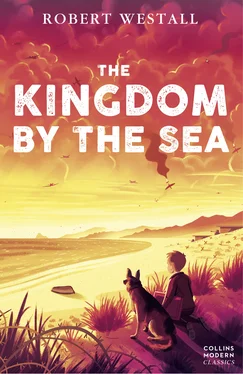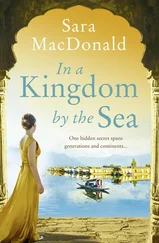He sat back with a sigh, and ate his own. It was a victory of sorts. He ate his sausage, which tasted good. He thought the chips would be awful, but they tasted good as well. When he was finished he looked down at his bare stomach. It was bulging – but it felt good and solid and cheering. And his underpants, though sandy, were nearly dry. And now the sun touched warmly on his back, and he came out in goose-pimples.
He looked all round, cautiously. There was still nobody about, though there was smoke coming from the chimney of one of the coastguard cottages on the headland. He thought he had time for a quick explore, along the tide-line, where you always found the interesting things.
The dog thought that was great. It began pouncing on all the patches of seaweed, killing them with its feet, dive-bombing them, then throwing them high in the air. He tried calling it to heel, as he had seen men do when they were walking their dogs on the beach.
It ignored him. He made up his mind to work on it. Its disobedience could get them both into trouble. It was then that he found the lump of soaking rope. He tried it for strength, stamping on one end, and pulling the other end with both hands. It seemed pretty strong, and it was one yard long, with frayed ends. He knew there was no point in calling the dog, but he waved the rope enticingly, and the dog came, and he grabbed its collar, and slipped the rope through. The dog promptly took off along the beach, dragging him after it. It was stronger than he was, and heavier. All he could do was hang on. The dog made terrible noises, like it was choking itself to death. But he hung on. He had to win. For both their sakes. It was a good dog, but only young. It had to learn.
Finally, it got tired of strangling itself, and walked quietly by his side. It was then he found the other useful thing. A washing-day ladle, like Mam used. About eight inches across, rusty, but it had no holes in it. It would do to give the dog water in. He came back to the boat full of triumph, and got dressed. As he did, two more pennies fell out of his trouser pocket. He searched every pocket after that, and ended up with threepence ha’penny.
He stared at it, lying in the pale palm of his hand, and despair fell on him, without warning, out of a clear blue sky, like a collapsing house. What good was threepence ha’penny? It wouldn’t even buy them a meal to share tonight. Only chips. And when the chips were gone, what then? And the next day, and the next, getting hungrier and hungrier. He could only get food by going to Cousin Elsie’s; and he knew what Uncle George would do with the dog. Straight down to the police station.
He stared at the sand for a long, long time. The dog, puzzled, impatient, leapt up and put its paws on his shoulders and looked at him trustingly. He could have died of agony.
And then he remembered his father’s voice again.
“Don’t flap around like a wet hen. Think! ”
And immediately, he realised he did have some money. In the Trustee Savings Bank. Seventeen pounds, ten shillings. All the money from all the birthdays and Christmases that Mam had made him save when he wanted to go out and spend it. Saving up for a rainy day, she had called it, when he raged and pleaded with her.
But where was the bank book?
In the attaché case, of course.
He dived in under the boat, and clicked open the case with trembling hands. There was a bundle of bank books, held together neatly by an elastic band. Dad’s on top, then Mam’s, then his. He opened it. It said, in neat curling writing, seventeen pounds, ten shillings. And he knew how to get it out; you only had to fill in a form, that was all. He had enough to keep himself and the dog for months. Wild excitement blew through him like a gale. He must get it! Now!
Then his eye drifted round the rest of the case; over the other precious things it contained. Dad’s best wristwatch, the one he only used for special occasions, in case it got scratched. The bright pink insurance books. A wedding photograph in a small silver frame, with Mam and Dad looking smooth, smiling and young. His own photograph in school uniform, from when he first went to the grammar school; a neat bundle of school reports. How proud of him they’d been! Tears pricked again, so he rushed on, being practical. The family ration books … a bar of Mam’s pongy special toilet soap, still in its paper wrapper. The scent wafted up to his nostrils … and he felt suddenly terribly guilty, as if he was burgling a church. He was never allowed to look inside the attaché case; it was private to Mam and Dad.
He took his own bank book and then slammed the case shut and clicked in the fasteners loudly. Well, as long as he carried the attaché case, Mam and Dad would still be with him. Like the Ark of the Covenant that the children of Israel carried all the way to the Promised Land.
To soothe himself, he carefully folded the blankets into a neat heap, then came out of the boat and smoothed down the sand to hide the entrance, and sat playing with the dog’s ears till his breathing came back to normal.
Not a moment too soon. There was a man coming out of the coastguard cottage, the one with the smoking chimney. Walking down the beach towards him. Harry could tell from the way he walked that he wasn’t a bad bloke. He walked slow and steady and contented, puffing on his pipe, stopping to look at things and touch them. Only a bit bossy, perhaps. As if it was his place.
“Good morning, young feller-me-lad! You’re the early bird that catches the worm!”
“Been swimming,” said Harry.
“So Aah noticed, while Aah was shaving. Said to the missus there was a young feller-me-lad, having a grand time wi’ his dog, on a Saturday morning early. Grand dog!” He bent and patted it. “What’s his name?”
“Don.”
The man looked for a name-medal on the collar and didn’t find any. “Dog could do with a combing. Sand won’t do his coat no good.”
“I always comb him when I get home.” Harry was amazed how neatly the lie popped out. Then he said, “What time is it, mister?”
“Half-past eight,” said the man, pulling out a pocket watch. “Better be on me way up yonder.” He pointed to the Coastguard Station on the cliff. “Just thought Aah’d have a word wi’ you, seeing you was having so much fun wi’ your dog. Only,” he added, “you could do wi’ a pair of bathing-trunks, instead of bathing in yer underpants. We’ll have young girls down here, later on.” He glanced around. “A towel wouldn’t do you any harm, either.” Harry glanced at him, suddenly hunched-up, wary. But the man gave him a conspiratorial grin. “Aah didn’t tell me mam all Aah was doing when Aah was young either.” And he was gone, leaving only a fragrant whiff of his tobacco smoke.
Three hours later, Harry lay back on the sand by the boat, closed his eyes, and let his mind stop whirling. What a terrible trip! He was never, never, never going up into the town again. Tommy Dodds had seen him, and Audrey Henry’s mother, and he’d only missed running into Cousin Elsie by diving up a back alley like a shot rabbit. He still wasn’t sure she hadn’t seen him. And the terrible wait in the bank, while the man counted out his money three times before he gave it to him, and he worried about Don tied to a lamp-post outside … when he’d got out, he took the bus straight back to Tynemouth. Thank God he’d had that threepence ha’penny, or he’d have had to give the conductor a ten-shilling note for the fare. And the conductor had still fussed about how sandy the dog was, and how it was making a mess of his bus … It had been stupid to go up into the town on a Saturday when everybody was out shopping. If he went on making stupid mistakes like that, he’d get caught for certain.
Читать дальше












